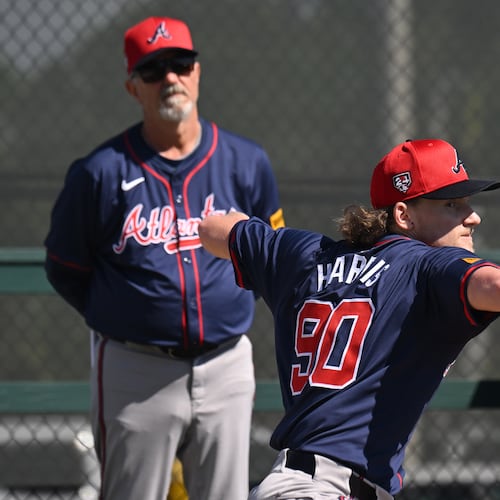Among several subplots, some unfortunate, during the Braves’ title-defense season, has been the eye injury to Eddie Rosario. The outfielder and National League Championship Series MVP underwent eye surgery last month that will sideline him for two to three months.
When Rosario played, he looked nothing like the player who tormented the Dodgers in October. He started 3-for-44 (.068) with 10 strikeouts in 15 games. For perspective, he had 14 hits during the six-game 2021 NLCS, which earned him series MVP honors. He also committed three fielding errors this season before the injury diagnosis.
Rosario, 30, reported vision issues to the team April 24. A day later, he visited a retina specialist, and surgery was recommended. Rosario underwent a laser procedure to correct “blurred vision and swelling in the right eye,” the team announced.
Rosario spoke with reporters for the first time Tuesday, explaining he used eye drops as he attempted to play through blurred vision, an issue that plagued him going back to spring training. As it grew untenable, Rosario reported his vision problems to the team.
“I felt normal sometimes,” Rosario said. “Sometimes, yes. Sometimes, no.”
The circumstances surrounding the eye condition and how it occurred are unclear. Rosario said the doctors didn’t tell him what caused the swelling. The office of the eye specialist who performed the procedure did not return calls from The Atlanta Journal-Constitution. The Braves have not provided any information about the condition or circumstances beyond their initial news release. Rosario said he has a doctor’s appointment Thursday.
“He’s still limited in what he can do, but at least he’s starting activity,” manager Brian Snitker said Monday. “He hasn’t done baseball stuff yet, still limited as he’s healing from the surgery. But looks good, sounds good, feels good. It’s just going to be a process until we get him going again.
“He says every day it’s getting better, as far as the sight and everything, when I was talking to him. It’s one of those things you can’t rush. Once they get through that, you can rush his baseball because he’s already been in shape one time. So we’re going to have to get him back going with that. Once he’s out of the woods with the medical part, he could amp up baseball activities when he’s cleared to do that.”
Rosario said he hasn’t yet regained his full vision but was told he will. The timetable for his return remains the same, likely around late July.
Dr. Brian Boxer Wachler, an ophthalmology specialist in Beverly Hills, Calif., and founder of the Boxer Wachler Vision Institute, has worked with numerous professional athletes with eye problems. Those individuals range from outfielder Tommy Pham to former NBA guard Derek Fisher to Olympic bobsled driver Steven Holcomb. While Boxer Wachler could not talk about the specifics of Rosario’s condition, he offered insight into how a professional athlete deals with eye problems.
“The reason I think I tend to see athletes is because vision is important to everybody, but it’s really important to an athlete,” Boxer Wachler told the AJC. “And so they can’t tolerate what somebody else might be able to. … Sometimes they think, ‘Oh, I just need a prescription update.’ Sometimes it’s something a lot more involved.”
That’s what Rosario discovered during his visit with a specialist, a problem that required more than a contacts adjustment.
“If one eye’s vision was blurred, with baseball, having binocular vision is really important,” Boxer Wachler said. “There’s oftentimes not a lot of room for error, in a way, because you need the acuity with both eyes, especially with depth perception. Binocular vision is just both eyes together, and that’s how you get the very best depth perception. So if one eye is blurry, and especially if that one eye is the dominant eye, because usually people have one eye that’s dominant, if that occurs in the dominant eye in an athlete, that can be pretty devastating.”
Boxer Wachler has seen some instances where athletes fear disclosing their vision issues because of how they’ll be perceived or how it might affect their status.
Holcomb, Boxer Wachler explained, struggled to tell coaches and teammates of his keratoconus (an eye disease) because he was concerned he’d be kicked off the team. Holcomb battled depression until he revealed his condition, Boxer Wachler said, and then was surprised by the support from teammates, fans and the community.
“There are always going to be athletes who are struggling from something, whether it’s a vision issue or any kind of medical issue,” Boxer Wachler said. “And I think Holcomb’s story has that important takeaway of, you’ll be surprised how supportive everybody is by being open in that position. Public figures can be surprised by how supportive people are around them.”
Rosario acknowledged the support he’s received May 13, when his first public comment since the procedure came via Instagram. He shared two photos of himself smiling in a Braves uniform, captioning the pictures: “I’m coming back soon, miss my teammates, miss the best fans out here and miss playing the game I love.”
The Braves acquired Rosario from Cleveland at the trade deadline last season, sending away infielder Pablo Sandoval in what amounted to a salary dump for the Guardians. Rosario became one of the great acquisitions in franchise history, helping the Braves earn another division title before erupting in the NLCS during the team’s World Series run.
Rosario became a free agent after the season. He went unsigned for much of the lockout-interrupted offseason before re-signing in March on a two-year, $18 million deal with a club option for 2024. Now the team eagerly awaits his return to the outfield, hoping he’ll once again be an important midseason add.
- Staff writer Justin Toscano contributed to this article.
About the Author
Keep Reading
The Latest
Featured


